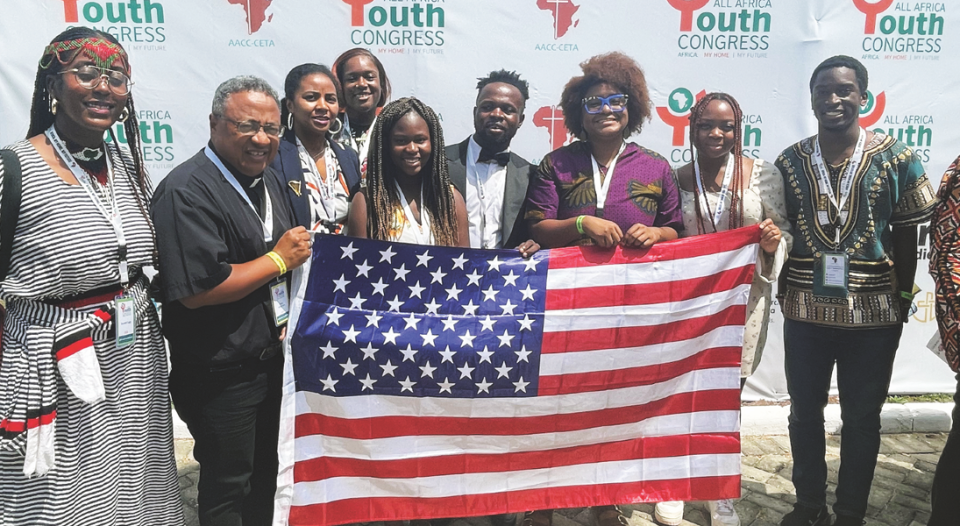It is no secret that being Black in the United States can be difficult. What is unknown, however, is how being a Black American on the African continent can be challenging in a way that is unique to the experience of people belonging to a marginalized diaspora.
In October, I and a group of young adults of African descent attended the All Africa Youth Congress (AAYC) hosted in Ghana, which focused on an initiative of the All Africa Conference of Churches to facilitate African patriotism from youth across the continent. The ELCA’s Service and Justice unit is a sponsor of the All Africa Council of Churches and of the AAYC event. The delegation of young adults represented the ELCA’s African Descent Ministries desk and its African National Ministries desk.
During our time in Ghana we were confronted with what it meant to be of the continent but not from it and spent time wading through the intricacies of our identities.
This wasn’t my first time in Africa. Having served with the Young Adults in Global Mission program in southern Africa in my early 20s, I had experience in explaining the differences between mainstream America and Black America to Black people not from the United States. The question is no different from the one asked by white people who are curious about where everyone comes from. We are a nation of immigrants, after all. The sting is just different when it comes from people who look like you.
“Where are you from?”
“The U.S.”
“But where are you from? Where are your people from?”
I could have been facetious. I could have given the history of the Great Migration, explaining the deeply rooted history on both sides of my family and how they traveled from Mississippi to Chicago to find opportunity and safety. This is a history even America is just beginning to truly acknowledge and celebrate—subsequently I would have been wasting my breath sharing it with AAYC participants.
Instead, I smiled and nodded and sheepishly explained the complexity of being a descendant of enslaved people in the United States.
Nearly every group of young adults we met at AAYC, from across the continent, adopted us as a means of acknowledging the sins of our country. My Nigerian name is Chiamaka—ChiChi for short. My Ghanian name is Naa Aku Shika.
A different experience
Other members of my group experienced a different type of inquisition. As first-generation Americans, some experiencing the African continent for the first time, they knew their home culture through the lenses of their parents and other family members. They felt the connection to their home countries deeply, yet they feared not being “African enough” and spent their time trying to prove they hadn’t been too westernized.
I’ve spent much of my adult life confounded by the stark differences between the mainline Lutheran church and the Lutheran church I grew up in. St. Stephen Lutheran Church, on Chicago’s South Side, sang from the Lutheran hymnal This Far by Faith and recited the Old English Lord’s Prayer (“Our Father which art in heaven, hallowed be thy name …”) during worship. I was part of the liturgical dance team, and my grandmother and aunt sang gospel songs with the choir every Sunday.
As I grew up and spent more time at churchwide events and at different ELCA churches around the country, I learned that my church experience is atypical of the ELCA, and I began to worry that I knew nothing about being Lutheran. I find myself, even today, introducing myself as a “cradle Lutheran,” as if my existence in the Lutheran church needs to be justified.
These experiences are a challenge for me. Black American culture is strong, and it is deep. Our culture is revered around the world, yet we are still expected to want to abandon it for the culture of our ancestors. We explain that the culture of our ancestors endures and that everything we do and experience is rooted in it, but there is still a disconnect, as if our desire to belong should supersede our pride in what we’ve built.
A need to feel at home
My need to explain how Lutheran I am and to shape the church to mirror my faith experiences connect to my larger desire to feel at home and to feel safe in that home.
As Black Americans, we should feel safe in proclaiming that we are Black Americans when meeting our siblings within the African Diaspora. As a Black Lutheran, I should feel at home in my church body. I desire these things. I want to live into the fullness of these things as a commitment to myself. As a commitment to my intersecting communities. As a commitment to God.
When we allow each other to live in the fullness of who we are and how we experience this life as humans, we allow the fullness of God to flow through us and to us. I continue to visit with my siblings of the African Diaspora across the continent and across the world. I continue to work for the church, sharing in the fullness of who God has baptized me as a Black woman in this Lutheran church.






